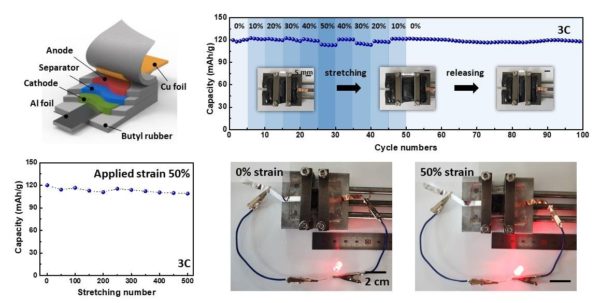Integrating electronics – and therefore energy generation or storage – into all sorts of devices is a fast-moving area of research, and one that places new and often strange requirements on electronic materials, by designing batteries that can be worked into clothing or other fabrics, for example.
Scientists at the Korea Institute of Science and Technology (KIST) had applications such as this in mind as they developed a lithium-ion battery with components that could be stretched by up to 50% without compromising on safety or performance.
Rather than trying to add inherently stretchable materials such as rubber to the battery components, the group focused on creating an “accordion-like” structure, adding stretchability to materials that are not inherently stretchable. Using graphene and carbon nanotubes, the scientists were able to construct a honeycomb-shaped composite framework, which was then compressed inwardly like an accordion to impart the stretchable properties.
They then combined the electrodes with a gel electrolyte and stretchable packaging materials to create a working lithium-ion battery. The design, described in the paper Stretchable Lithium-Ion Battery Based on Re-entrant Micro-honeycomb Electrodes and Cross-Linked Gel Electrolyte, published in ACS Nano, demonstrated a capacity of 5.05 milliamp hours per square centimeter, maintaining 95.7% of this performance after 100 charge-discharge cycles. The battery also exhibited “superior electrochemical performance,” according to KIST, after 500 stretch-release cycles when the material was stretched up to 50%.

Image: KIST
The university notes that all of the materials within the battery are active in the battery, with the stretchable properties added as a bonus. Jeong Gon Son, who led the research at KIST, says that he expects the stretchable design to “present a new paradigm in terms of stretchable energy storage systems for the further development of wearable and body-implantable electronic devices.”
This content is protected by copyright and may not be reused. If you want to cooperate with us and would like to reuse some of our content, please contact: editors@pv-magazine.com.




2 comments
By submitting this form you agree to pv magazine using your data for the purposes of publishing your comment.
Your personal data will only be disclosed or otherwise transmitted to third parties for the purposes of spam filtering or if this is necessary for technical maintenance of the website. Any other transfer to third parties will not take place unless this is justified on the basis of applicable data protection regulations or if pv magazine is legally obliged to do so.
You may revoke this consent at any time with effect for the future, in which case your personal data will be deleted immediately. Otherwise, your data will be deleted if pv magazine has processed your request or the purpose of data storage is fulfilled.
Further information on data privacy can be found in our Data Protection Policy.